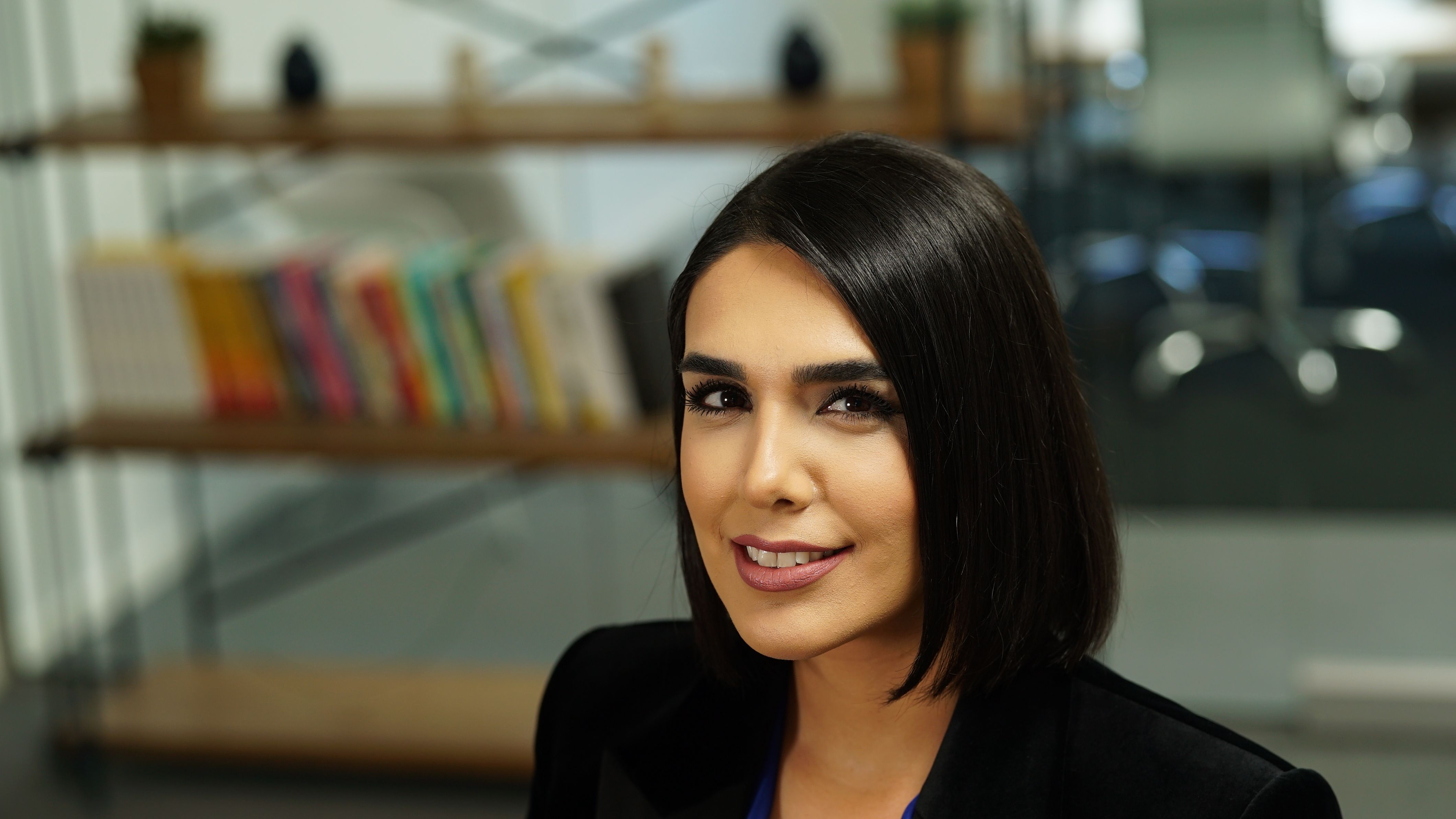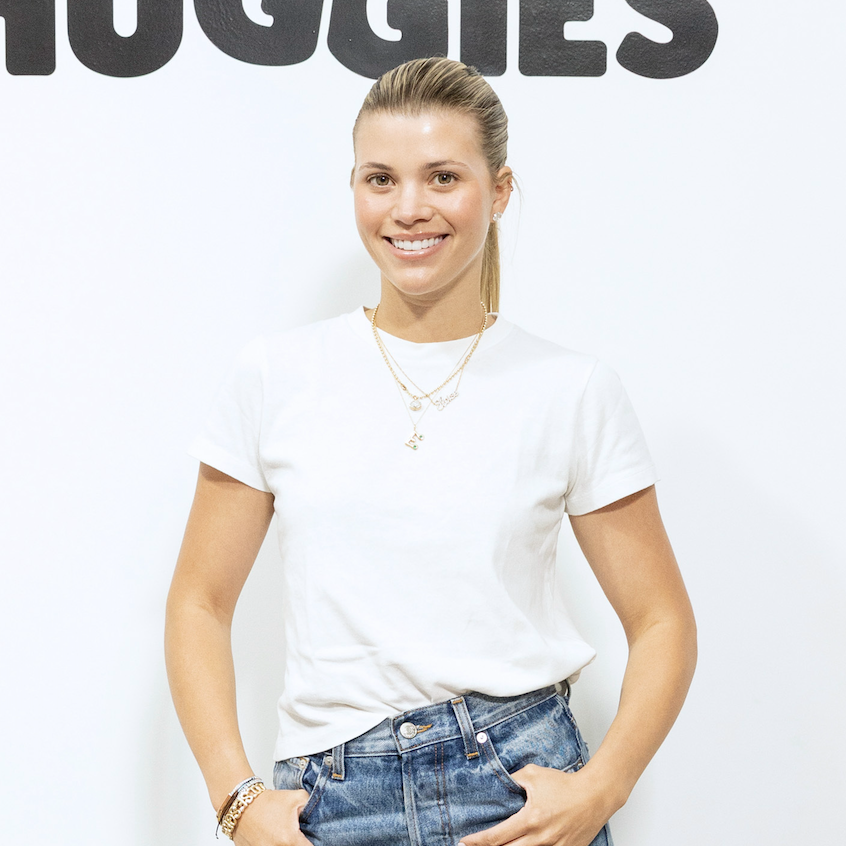How Node CEO Falon Fatemi Built Tech That Predicts the Future
And won over investors—including resident shark Mark Cuban.

Falon Fatemi is used to breaking new ground. She was Google’s youngest employee when she joined at age 19. Now 34, Fatemi is founder and CEO of Node, a San Francisco–based company shaping the way businesses use artificial intelligence (with the help of backers including Mark Cuban and JetBlue). In July, Node unveiled its Artificial Intuition platform, which lets companies use AI to find new customers and foresee which employees are most likely to leave. Here, she shares her past and her predictions for AI’s future.
Marie Claire: You come from a family of entrepreneurs. What did you learn from them about running a business?
Falon Fatemi: I was very much raised with the immigrant mentality. My parents left Iran during the revolution and came to this country with nothing. They ingrained a lot of discipline in my brother and me, and also a big focus on education and self-improvement. They raised us in Silicon Valley, where both of them worked at semiconductor companies. My father had a number of patents and inventions and started several companies. My mom left the workforce after I was born and started investing in real estate. She continues to manage properties—remodeling them, selling them, renting them out.
What I learned from my parents is you work hard, you believe in yourself, you set goals, you don't give up, and you can do anything. Growing up, I wasn't allowed to get just any job, like my friends. I had to get a job that was going to further my career in some way. One of my first summer jobs at 16 was doing patent research for a law firm.
MC: How did you land the job at Google?
FF: I was a sophomore at Santa Clara University, and I took an entrepreneurship course by serial entrepreneur Mary Furlong, who has built a lot of products for the aging population. I was fascinated by this notion that you could have an idea and then get funding for it. She recruited me to do a research project for Microsoft. It was through that project that I got recommended by a VP at Google.
MC: How did you hold your own as a 19-year-old?
Stay In The Know
Get exclusive access to fashion and beauty trends, hot-off-the-press celebrity news, and more.
FF: I had incredible managers and mentors. Kim Jabal, who’s now on the board of FedEx, was my manager. So was Stacy Brown-Philpot, who’s now the CEO of TaskRabbit. I didn't even think about how old I was. I was just using this incredible opportunity to work with the builders of the company. At Google, you could reach out to anyone, no matter seniority, and have lunch with them, get to know them.
MC: How often did you set up these lunches?
FF: I would try at least a couple times a month. I had a set of questions that always included, “Are you happy?” Because I really wanted to understand, not only the drivers of their career path but also do they feel fulfilled by it? That really helped me to form my own career path.
A post shared by Falon Fatemi (@falonfatemi)
A photo posted by on
If my name was Jack instead of Falon, I would have raised double the amount of money and probably have double the valuation.
MC: What spurred the idea for Node?
FF: After Google, I spent six years at start-ups and doing consulting for start-ups and venture capitalists. I was making a lot of introductions at that time. There was one week I had multiple people come up to me and say something to the effect of, “Hey Falon, a couple years ago, you introduced me to this person who is now my co-founder. We just raised $20 million. Thank you for helping us connect.” That was the aha moment. I was like, What if I could prototype intuition? That human intuition that I have for making these connections between people?
MC: But how do you actually predict the future?
FF: You use your intuition to make decisions every day—what you should eat for dinner, whether you should set up two friends on a blind date. Node's artificial intuition technology functions similarly. Just like your personal intuition evolves and improves over time, Node's technology learns from the outcomes.
We can identify signals—implicit and explicit—that are important in driving prediction. You teach it “here are examples of my best customers.” It will build a prediction around it and then learn from the predictions it makes, so it can identify new markets of opportunity you might have never gone after otherwise. The uses can range from ”I want to find more customers like my best customers” to “I want to identify which key employees are likely to leave so I can do something about it.”
MC: Where do you see the future of this technology going?
FF: AI is already changing everything. This will end up creating a much more powerful and personalized experience. Imagine a world where our travel experiences are personalized to us. We're getting recommendations for not only the vacation we should go on that we don't even know to search for today, but also getting a personalized experience around what we should we do there. What are the restaurants you would love?
Longer term, we believe that everyone should have their own intelligent artificial agent whose job is to understand what you care about, understand what's going on in the world, and surface opportunities to you before you even know to ask.
MC: There are rightful concerns about AI and bias—that AI is learning from and incorporating our own biases. How are you addressing that?
FF: These technologies are tools, and how they are utilized matters. They require data. So, if the data is biased or the individuals who are training it are biased, that's going to affect how the systems make decisions. It does have the same technology that we're all fearful about that can reinforce our bias, but it also has the potential to overcome that and be a solution. For example, let’s say that you want to use Node to find more employees like your best employees, but your best employees are all male and they went to a particular school, so already that data is biased. What you can do with Node is say, “I want to find more employees like the best employees, but who are more diverse.” You can actually use our technology to solve those sorts of problems.
MC: Did you have any challenges raising money?
FF: I think the biggest challenge, being a female founder of a deep tech company—which is making fundamental breakthroughs in science and technology—is that I don't look the part. And that comes with a level of sexism when you meet with predominantly male investors to evaluate investing in your company. We have to pitch a far greater number of people, and we get less money than our male counterparts, which means we are constantly fundraising. That has its own impact on the business, because our focus has been distracted by trying to raise funds.
My technical leadership team, these guys are AI luminaries. If I had the same credentials, and my name was Jack instead of Falon, I'd give it an 80 percent shot that I would have raised double the amount of money [Node has raised $36 million as of publication] in a much shorter period of time and probably have double the valuation.
MC: You fund women-owned businesses as an angel investor. What do you look for?
FF: The majority of my investments are female-founded companies using deep technology to make the world a better place. For example, I invested in Athena Security, started by Lisa Falzone. She’s a parent who built this company for the future of all of our children. It’s leveraging AI to prevent crime. It can detect if someone has a weapon and then help with preventative action. That's an example of an incredible woman working on an incredible mission and absolutely the type of founder that I want to back.
MC: What advice do you give other female founders?
FF: If there's one piece of advice I have, it's be open to the opportunities that are all around you that might be unconventional or that you might not have thought of.
MC: What do you do to unwind?
FF: My husband and I live by Napa Valley, so we spend a lot of time there. I also love watching Netflix documentaries. I recently watched General Magic, about a company that was trying to create the iPhone in the ‘80s and was a commercial failure. The documentary basically explored the definition of failure. If General Magic didn't exist, we would not have the iPhone or Android today.
MC: I’ll ask you the question you used to ask people at Google: Are you happy?
FF: I love this. And, oh yes, I am happy.
For more stories like this, including celebrity news, beauty and fashion advice, savvy political commentary, and fascinating features, sign up for the Marie Claire newsletter.
RELATED STORY

-
 Sofia Richie Grainge's Necklace Stack Has the Sweetest Hidden Meaning
Sofia Richie Grainge's Necklace Stack Has the Sweetest Hidden MeaningNo wonder she wears it constantly.
By Kelsey Stiegman
-
 Kate Middleton Broke Tradition With Prince Louis's Adorable 7th Birthday Photo and Video
Kate Middleton Broke Tradition With Prince Louis's Adorable 7th Birthday Photo and VideoThe Princess of Wales is switching up the way she marks birthdays.
By Kristin Contino
-
 Florence Pugh Takes the Pointe Shoe Trend Center Stage
Florence Pugh Takes the Pointe Shoe Trend Center StageShe's so back.
By Kelsey Stiegman
-
 Peloton’s Selena Samuela on Turning Tragedy Into Strength
Peloton’s Selena Samuela on Turning Tragedy Into StrengthBefore becoming a powerhouse cycling instructor, Selena Samuela was an immigrant trying to adjust to new environments and new versions of herself.
By Emily Tisch Sussman
-
 This Mutual Fund Firm Is Helping to Create a More Sustainable Future
This Mutual Fund Firm Is Helping to Create a More Sustainable FutureAmy Domini and her firm, Domini Impact Investments LLC, are inspiring a greater and greener world—one investor at a time.
By Sponsored
-
 So Your Company Is Diverse, Now What?
So Your Company Is Diverse, Now What?Morgan DeBaun, CEO and co-founder of Blavity, shares her best advice for running a multicultural company.
By Morgan DeBaun as told to Maria Ricapito
-
 The Competition for Creators
The Competition for CreatorsCreators hold more power than ever—and companies are taking stock.
By Rachel Epstein
-
 Power Players Build on Success
Power Players Build on Success"The New Normal" left some brands stronger than ever. We asked then what lies ahead.
By Maria Ricapito
-
 Don't Stress! You Can Get in Good Shape Money-wise
Don't Stress! You Can Get in Good Shape Money-wiseFeatures Yes, maybe you eat paleo and have mastered crow pose, but do you practice financial wellness?
By Sallie Krawcheck
-
 The Book Club Revolution
The Book Club RevolutionLots of women are voracious readers. Other women are capitalizing on that.
By Lily Herman
-
 The Future of Women and Work
The Future of Women and WorkThe pandemic has completely upended how we do our jobs. This is Marie Claire's guide to navigating your career in a COVID-19 world.
By Megan DiTrolio